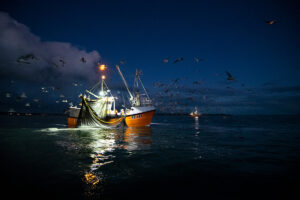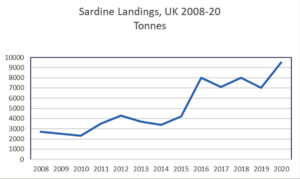The Cornish ring-net sardine fishery has won the long-term confidence of Tesco, which last week launched a new Cornish sardine product bearing the Marine Stewardship Council (MSC) label.

The purpose-built modern ring-netter Asthore PZ 181 has the same name and PLN as its forebearer, a steam drifter built in 1926, emphasising the long Cornish tradition with sardines. The upswing in the fishery has seen a new generation of investment in safe, modern and versatile ring-netters, capable of diversifying into other fisheries. (Photo: MSC)
This cements the development of the fishery, which has gradually moved from a small-scale artisanal product, salted pilchards, to the mainstay of a vibrant and modern inshore fleet over the last two decades.
The fishery now supports a fleet of up to 15 purpose-built ring-netters, up to 15m in length, working from Newlyn, Mevagissey, Falmouth and Plymouth, from the start of the season in July through to February.
The launch of the new sardine product follows a remarkable turnaround for the fishery, after pilchards were rebranded as Cornish sardines in the 1990s. The fishery was certified by the MSC in 2010, and is the only fishery in the world for this species that carries the eco-label.
Tom Pascoe, one of the fishermen who supplies to Tesco, said: “This fishery has been a huge success and we want to ensure it goes on as much as possible. It’s fantastic to have this new Tesco product in store and the backing of a major retailer.”

Landings of Cornish sardines have increased steadily, reflecting both the healthy state of the stocks, and a growing demand for the quality fish being landed. The stock straddles UK and French waters, but the Cornish fleet now accounts for more than two-thirds of landings. (Source: UK fisheries statistics)
While Cornish sardines have previously been available in UK supermarkets, they have mostly been sold fresh on fish counters, or in frozen or chilled packs. The vast majority of canned sardines sold in UK supermarkets are imported. The new Cornish sardine product is aimed at the premium end of the market, maximising the value of their catches for Cornish fishermen. Sardines, or pilchards as they were
previously known, have been fished in Cornwall for 500 years, mainly with drift-nets, a fishery that continued until groundbreaking investment in a new class of ring-netters started in the late 1990s.
At the beginning of the 20th century, there were dozens of plants salting and exporting barrels of Cornish pilchards to Europe, though by the 1990s this had declined drastically. The final pilchard salting company, The Pilchard Works, based in Newlyn, ceased production of this traditional salted product in 2006, when they switched fully to production of a premium canned product. By this time, however, the company had enabled and supported the development of the new sardine fishery, based on fresh, frozen and canned Cornish sardines.
This story was taken from the latest issue of Fishing News. For more up-to-date and in-depth reports on the UK and Irish commercial fishing sector, subscribe to Fishing News here or buy the latest single issue for just £3.30 here.








